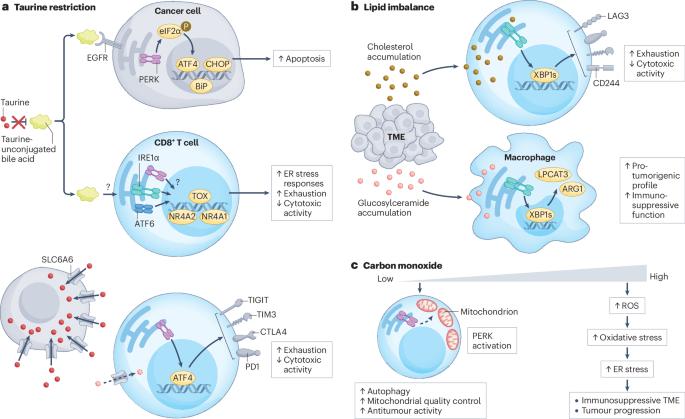Endoplasmic reticulum stress responses in anticancer immunity
IF 66.8
1区 医学
Q1 ONCOLOGY
引用次数: 0
Abstract
The endoplasmic reticulum (ER) has a central role in processes essential for mounting effective and durable antitumour immunity; this includes regulating protein synthesis, folding, modification and trafficking in immune cells. However, the tumour microenvironment imposes hostile conditions that disrupt ER homeostasis in both malignant and infiltrating immune cells, leading to chronic activation of the unfolded protein response (UPR). Dysregulated ER stress responses have emerged as critical modulators of cancer progression and immune escape, influencing the initiation, development and maintenance of antitumour immunity. In this Review, we examine how tumour-induced ER stress reshapes the functional landscape of immune cells within the tumour microenvironment. We highlight recent discoveries demonstrating how ER stress curtails endogenous antitumour immunity and reduces the efficacy of immunotherapies. Furthermore, we underscore novel therapeutic strategies targeting ER stress sensors or UPR components to restore immune function and enhance cancer immunotherapy outcomes. Together, this provides a comprehensive overview of the interplay between ER stress responses and antitumour immunity, emphasizing the potential of UPR-targeted interventions to improve immune control of cancer. The endoplasmic reticulum (ER) has a central role in mounting effective and durable antitumour immunity. In this Review, Hwang et al. outline how tumour-induced ER stress responses alter the function of intratumoural immune cells and the efficacy of immunotherapy, highlighting the potential of unfolded protein response-targeted interventions to improve cancer outcomes.


内质网应激在抗癌免疫中的作用
内质网(ER)在建立有效和持久的抗肿瘤免疫必不可少的过程中起核心作用;这包括调节免疫细胞中的蛋白质合成、折叠、修饰和运输。然而,肿瘤微环境施加不利条件,破坏恶性和浸润性免疫细胞的内质网稳态,导致未折叠蛋白反应(UPR)的慢性激活。失调的内质网应激反应已成为癌症进展和免疫逃逸的关键调节剂,影响抗肿瘤免疫的启动、发展和维持。在这篇综述中,我们研究了肿瘤诱导的内质网应激如何重塑肿瘤微环境中免疫细胞的功能景观。我们强调最近的发现表明内质网应激如何抑制内源性抗肿瘤免疫并降低免疫疗法的疗效。此外,我们强调了针对内质网应激传感器或UPR成分的新治疗策略,以恢复免疫功能并提高癌症免疫治疗效果。总之,这提供了内质网应激反应与抗肿瘤免疫之间相互作用的全面概述,强调了以uprr为目标的干预措施改善癌症免疫控制的潜力。
本文章由计算机程序翻译,如有差异,请以英文原文为准。
求助全文
约1分钟内获得全文
求助全文
来源期刊

Nature Reviews Cancer
医学-肿瘤学
CiteScore
111.90
自引率
0.40%
发文量
97
审稿时长
6-12 weeks
期刊介绍:
Nature Reviews Cancer, a part of the Nature Reviews portfolio of journals, aims to be the premier source of reviews and commentaries for the scientific communities it serves. The correct abbreviation for abstracting and indexing purposes is Nat. Rev. Cancer. The international standard serial numbers (ISSN) for Nature Reviews Cancer are 1474-175X (print) and 1474-1768 (online). Unlike other journals, Nature Reviews Cancer does not have an external editorial board. Instead, all editorial decisions are made by a team of full-time professional editors who are PhD-level scientists. The journal publishes Research Highlights, Comments, Reviews, and Perspectives relevant to cancer researchers, ensuring that the articles reach the widest possible audience due to their broad scope.
 求助内容:
求助内容: 应助结果提醒方式:
应助结果提醒方式:


